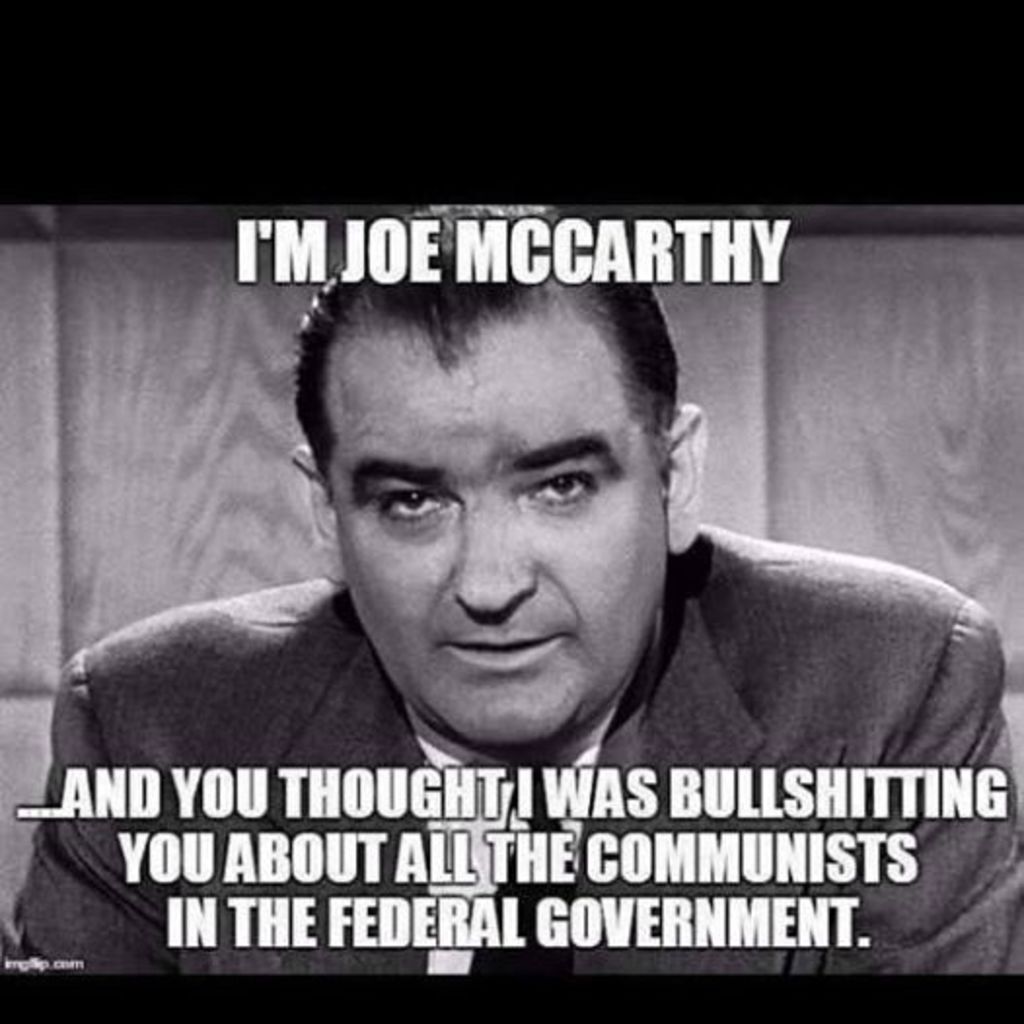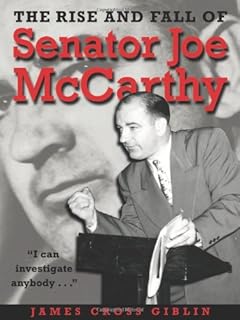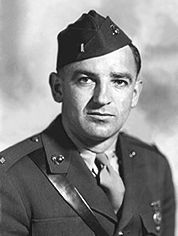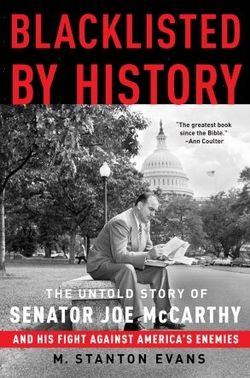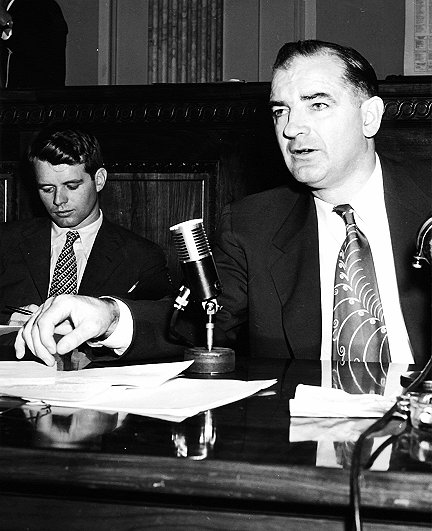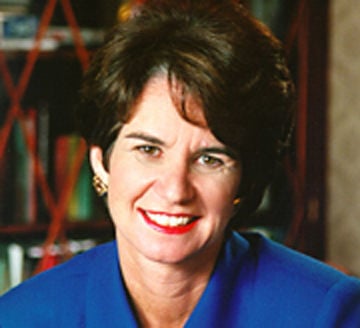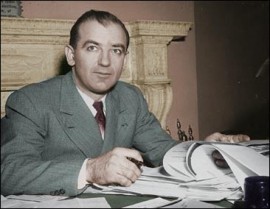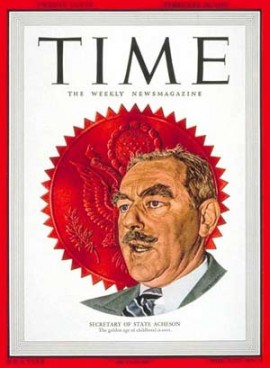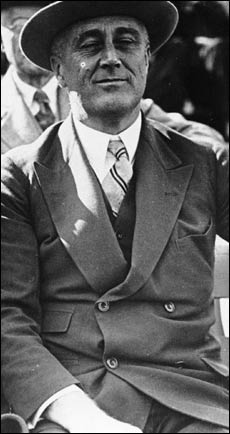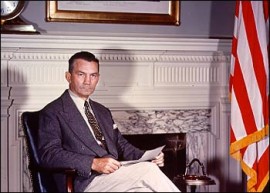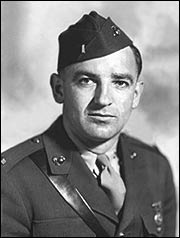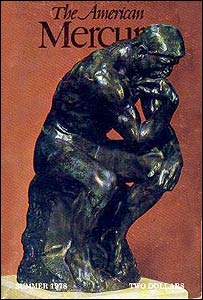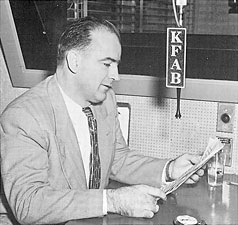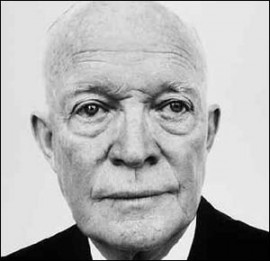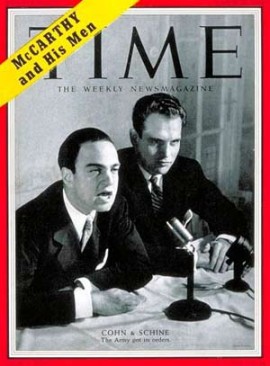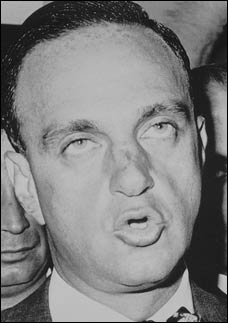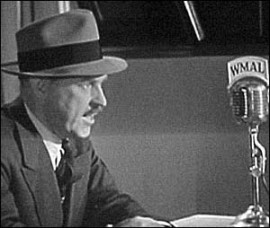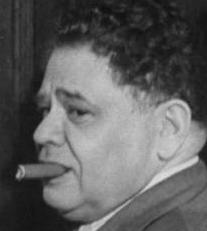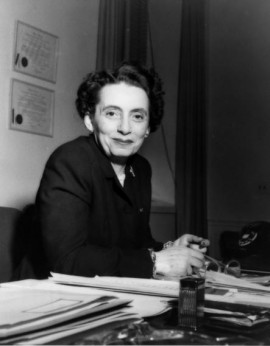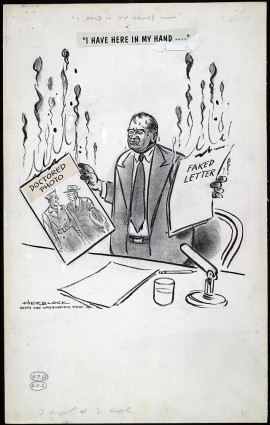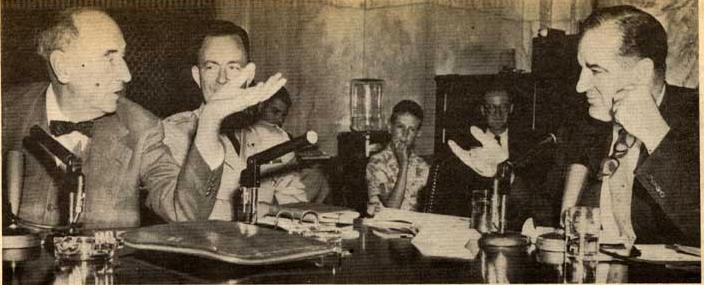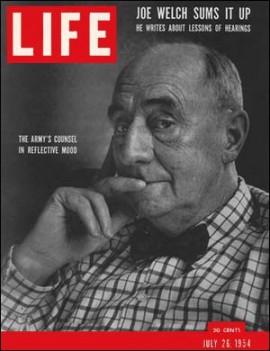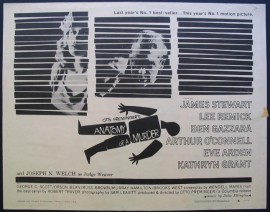Early life
Joseph McCarthy was born to a poor Irish Catholic farm family in
Appleton, Wisconsin.
A hyperactive, extroverted youth, he dropped out of school
after eighth grade to start
his own poultry business. After the chickens all
died, he enrolled in the local public high
school. Thanks to enormous energy
and a retentive mind, he finished his coursework
in less than a year at age 20.
After two undergraduate years at Marquette University, a
leading Jesuit school in Milwaukee, McCarthy entered Marquette Law School, acquiring
the rudiments of the profession
that he soon used to knit together a statewide network
among Irish and German
Catholics. McCarthy was a practicing Catholic his entire life,
but rarely referred
to religion or ethnicity in his speeches. He actively supported President
Franklin D. Roosevelt in the Young Democrats, but did not join Irish organizations.
Although defeated in his 1936 race for district attorney, McCarthy displayed remarkable
campaign abilities and an astonishing memory for faces. He had the energy and determination
to meet every voter in person, exuding charm and a concern for the voter as an individual.
The same tactics paid off in 1939, when he was successful in a nonpartisan contest
for a regional judgeship.
The youngest
judge in state history, he worked long hours to clear up a large backlog.
He
administered justice promptly and with a combination of legal knowledge and good
sense.
He was still a Democrat, but that party was very weak statewide at the time.
Military service
In 1942 McCarthy,
volunteered for the Marines (as a judge he was draft exempt), becoming
an intelligence officer in an aviation
unit heavily engaged in combat in the South Pacific.
Although assigned a desk
job McCarthy flew numerous combat missions as a tail gunner
—he exaggerated
the number to qualify for a Distinguished Flying Cross.
During
his 30 months of military service, McCarthy's record was unanimously praised by
his commanding officers and Admiral Chester Nimitz, commander in chief of the Pacific
Fleet. Admiral Nimitz issued the following
citation regarding the service of Captain McCarthy:
| “ | For meritorious and efficient performance of duty as an observer and rear gunner
of a dive bomber attached to a Marine scout bombing squadron operating in the Solomon Islands area from September 1 to December 31, 1943. He participated in a large number of combat missions,
and in addition to his regular duties, acted as aerial photographer. He obtained excellent photographs
of enemy gun positions, despite intense anti-aircraft fire, thereby gaining valuable information
which contributed materially to the success of subsequent strikes in the area. Although suffering from a severe leg injury, he refused to be hospitalized and continued to
carry out his duties as Intelligence Officer in a highly efficient manner. His courageous devotion
to duty was in keeping with the highest traditions of the naval service. | ” |
Elected to Senate, 1946
McCarthy had his name entered in the Republican
primary for U.S. Senate in 1944,
opposing a well-entrenched incumbent Republican,
Alexander Wiley. The absentee
war hero ran a strong second, making a name for
himself statewide and making himself
available for the 1946 Senate contest.
Why McCarthy suddenly changed parties was never explained, but
prospects for ambitious
Wisconsin politicians were dim inside the poorly organized
Democratic party, for most
New Dealers supported the state’s Progressive party. During the war, however, that
party collapsed, torn apart between its New Deal domestic liberalism, and its intensely
isolationist opposition to Roosevelt’s
foreign policy. Increasingly out of touch with
Wisconsin, its leader Robert LaFollette Jr. looked to his family’s past glories and
made the blunder of trying for
reelection to the Senate in 1946 as a Republican.
"Tail
Gunner Joe," as his posters called him, endlessly crisscrossed Wisconsin while
LaFollette
remained in Washington, offered an alternative in the Republican primary
to old
guard Republicans who had opposed the Lafollettes for a half century. McCarthy
brilliantly
captured the frustrations citizens felt about massive strikes, unstable economy,
price controls, severe shortages of housing and meat, and the growing threat of from the
far left in the CIO. He nipped LaFollette in the primary. The slogan “Had Enough?—Vote
Republican” gave the Republicans a landslide all across the North, electing a new
junior senator from Wisconsin.
Communist Issue
In Washington, McCarthy was a mainstream conservative
in domestic policy, and, like
many veterans, was an internationalist in foreign
affairs, supporting the Marshall Plan
and NATO. His speeches rarely mentioned domestic Communism or flaming issues
like the
Alger Hiss espionage case, but that suddenly changed in early 1950 when his
vivid anti-Communist rhetoric drew national attention. "The issue between the Republicans
and
Democrats is clearly drawn. It has been deliberately drawn by those who have
been in charge of twenty years of treason.” Alleging there were many card-carrying
Communists in U. S. President Harry S. Truman’s State Department, McCarthy forced
a Senate investigation led by Millard
Tydings, Democrat of Maryland. McCarthy named
numerous suspect diplomats but failed to convince the three
Democrats on the panel;
they concluded his allegations were “a fraud and
a hoax,” while the two Republicans
dissented. McCarthy retaliated by campaigning
against Tydings, who was defeated for
reelection in November 1950. What the
senator himself called McCarthyism was a factor
in key races across the country;
all his candidates won and his stock soared. A few
weeks later American forces
were crushed by the Chinese in Korea, and in spring
1951 Truman tried to shift the blame by firing General Douglas MacArthur.
Support from Catholics and Kennedys
The great majority of Catholics were anti-Communist, but they were
also loyal Democrats,
so to enlarge his base McCarthy, a Republican, needed
an alliance with anti-Communist
Catholics. The Catholic bishops and the Catholic
press was "among McCarthy's most
fervid supporters." A major connection
was with the powerful Kennedy family, which had
very high visibility among all
Catholics in the Northeast.[7] Well before he became famous
McCarthy became closely associated with Joseph P. Kennedy, Sr.. He was a frequent
guest at the Kennedy compound in Hyannis Port and at one
point dated Joe's daughter
Patricia. After McCarthy became nationally prominent,
Kennedy was a vocal supporter
and helped build McCarthy's popularity among Catholics.
Kennedy contributed cash and
encouraged his friends to give money. Some historians
have argued that in the Senate
race of 1952, Joe Kennedy and McCarthy made a
deal that McCarthy would not
make campaign speeches for the Republican ticket
in Massachusetts, and in return,
Congressman and future U.S. President John F. Kennedy would not give anti-McCarthy
speeches. In 1953 McCarthy hired Robert Kennedy as a senior staff member. When the
Senate voted to censure McCarthy in 1954,
Senator Kennedy was in the hospital and never
indicated then or later how he
would vote; he told associates he could not vote against
McCarthy because of
the family ties.
Political dominance
In 1950, McCarthy discussed his upcoming 1952 campaign with three
fellow Catholics
(Father Edmund A. Walsh and Charles H. Kraus of Georgetown University and Washington
attorney Wiliam A. Roberts). Kraus had recommended Father
Walsh's recent books
dealing with Communism to McCarthy, and was hoping to interest
McCarthy in the problems
of Communism in the world. McCarthy's reputation among
the voters was not good at
that time, due to various ethical and tax violation
problems, and he needed an issue that
would help improve his chances of re-election.
He latched enthusiastically onto the idea
of attacking Communists in the government.
Subsequently, McCarthy called Willard Edwards of the Chicago Tribune asking for assistance
with a speech on Communism. Edwards sent some materials,
including a copy of a letter
written on July 26, 1946, by James F. Byrnes, Secretary of State under Truman. This
letter was the central support for
McCarthy's subsequent claims to have a list of
Communists in the government.
- "Pursuant
to Executive Order, approximately 4,000 employees have been transferred...
- Of those 4,000
employees, the case histories of approximately 3,000 have been
- subjected to a preliminary
examination, as a result of which a recommendation against
- permanent employment has been
made in 284 cases by the screening committee...
- Of the 79 actually separated from the service,
26 were aliens and therefore under
- "political disability" with respect to employment
in the peacetime operations of the
- Department. I assume that factor alone could be considered
the principal basis
- for their separation."
This document was repeatedly cited by McCarthy as the basis for
his accusations; unfortunately, there was no list at that time.
McCarthy now became one of the dominant leaders in American politics, with strong
support among both Republicans and Catholic Democrats, as he alleged that Truman’s
top people had betrayed America. He singled out Secretary of State Dean Acheson and
Secretary of Defense George Marshall. Liberals were aghast; Truman had picked General
Marshall to head the State
and Defense departments precisely because he thought the
elderly statesman would
always be above criticism, no matter that China turned from a
staunch ally to
a bitter enemy on his watch. McCarthy’s blistering attacks on Marshall as
“part of a conspiracy so immense, an infamy so black, as to dwarf any in the history of
man” fueled the belief he was a wild-man, a pathological liar who overstepped the
bounds of political discourse.
With Dwight D. Eisenhower crusading against “Korea, Communism and Corruption” in
1952, Republican
victory was assured. As a senior member of the majority party McCarthy
for
the first time became a committee chairman, with control of staffing and agenda. He
used
his Government Operations Committee to open highly publicized hearings in
1953-54
alleging disloyalty in the State Department, the United States Central Intelligence Agency
(CIA), the U.S. Information Agency, and finally the Army. His furious attacks
on the Army
led to the televised “Army-McCarthy” hearings in spring
1954, which exposed his bullying
tactics to a national audience. As McCarthy’s
poll rating plunged, his enemies finally
pulled together to introduce a censure
resolution focused on charging McCarthy
with contempt for the federal government,
and especially for his fellow senators.
Backlash
McCarthy’s charges that over-educated liberals
tolerated Communism at home and abroad
had stung the liberals. He alleged that
they had corruptly sold out the national interest
to protect their upper class
privileges, and were so idealistic about world affairs that
they radically underestimated
the threat posed by Soviet dictator Stalin, his spies, and
the worldwide Communist movement. Instead of refuting the
allegations, Liberals tried
one of two approaches. Some became intensely anti-Communist
and claimed they were
more effective than McCarthy and the Republicans in eliminating
Communism in the
unions and Democratic party, and in containing the Stalinist
menace in Europe. The other
approach was to counterattack, to charge that “McCarthyism”
never found a single spy
but hurt innocent people in hunting for nonexistent
witches; thus it represented an evil
betrayal of American values. In an appeal
to upscale conservatives and liberal intellectuals,
critics ignored the Communist
infiltration of labor unions and liberal causes and focused
on stereotyping anticommunists
as ill-mannered ignorant troglodytes, oblivious to American
traditions of free
speech and free association. McCarthy’s exaggerations and false charges
encouraged opponents to stress the second approach, but it escalated the controversy
to a pitch of hatreds and fears unprecedented since the days of Reconstruction.
Loss of influence
McCarthy’s superb sense of timing and his media instincts kept his partisan
attacks
on the front page every day; his willingness to do battle in the hustings
with Democratic
opponents across the country strengthened his base in the Republican
party. His
religion and ethnicity, refreshed with highly visible friendships
with leading Irish Catholics,
especially the Kennedy family, bolstered his standing
among Democrats. According to
Gallup, McCarthy’s popularity crested in
January 1954, when he was endorsed by all
voters 50-29 (with 21 having no opinion).
His core support came from Republicans and
Catholics who had not attended college.
McCarthy, however, failed to create any sort of grass
roots organization. He had no
organizational skills; he did not effectively
use his talented staffers (such as Robert Kennedy).
He was a loner who lurched from issue to issue, misled by the enormous media
publicity
into believing that a one-man crusade was possible in an increasingly
well-educated
complex society honeycombed with local, regional and national organizations.
By operating
within the Republican party apparatus he lost the opportunity to
create an independent grass
roots political crusade in the style of Teddy Roosevelt, Huey Long, or Ross Perot. He
never launched his own magazine or radio show or formed alliances with publishers
who agreed with him.
McCarthy’s
strained relations with Senate colleagues created a trapdoor. It was sprung
after
many Republicans realized that he had shifted the attack away from the Democrats.
What use was his slogan “20 Years of Treason” once Eisenhower was in office? McCarthy’s
answer was “21 Years of Treason!” Eisenhower’s supporters could no longer tolerate such
a loose cannon, and as McCarthy unwisely shifted his attacks to Eisenhower’s beloved
Army,
his cause was doomed. While many Americans distrusted Ivy League, striped pants diplomats,
soldiers were held in high regard; McCarthy’s
charges of subversion were flimsy (one Communist
dentist had been automatically
promoted); he sabotaged his own reputation by finagling favors
for an aide who
had been drafted. The televised hearings proved fatal to an ill-prepared bully.
After the Democrats regained control of Congress in the 1954 elections, the censure motion
carried, 67-22. McCarthy’s appeal, so widespread yet superficial,
evaporated
overnight and the Senator faded into the shadows.
The term "McCarthyism"
McCarthy is permanently associated with the use of the word "McCarthyism" (a word which
he did not coin, but of which he did make use according to a sense more aligned with his
actual philosophy) to mean an aggressive attack on Communists who had infiltrated America
and on the liberals who protected them—an attack, however, without regard for due
process. Although the left was unable to make heroes of the people who supported and
sometimes were controlled by Stalin, they did make heroes of opponents of McCarthy,
painting him as the internal menace to American values that was far worse than
Communist subversion. Schrecker (1998) sees McCarthyism as anti-Communist political
repression of the early Cold War, and explores its mechanisms through, and what she
considers the exaggerated public fears on which it depended. During the 1940s-1950s,
McCarthyism took on a variety of forms with an array of agendas, interested parties,
and modes of operating. Despite its widespread and popular character, it started with
the federal government and was driven by a network of dedicated anti-Communist
crusaders such as J. Edgar Hoover, director of the United States Federal Bureau of
Investigation (FBI). McCarthyism's repression both responded to and
helped create widespread
fears of a significant threat to national security.
Margaret Chase Smith, Republican senator from Maine, gained a national reputation as
one of the earliest critics McCarthyism with
a Senate speech on June 1, 1950, called
"the Declaration of Conscience."
It was an attempt by Smith to address the excesses of
McCarthyism, and was widely
hailed as a call to reason by McCarthy's opponents. Smith
gave a critique of
the American political process and political institutions in the responses
to
dissent on the left and the right. Smith, like other McCarthy critics, sought to bring a
level of civility to political protest and dissent. She and many others who objected to
the tactics of McCarthy actually believed in the underlying tenets of his anti-Communist
crusade. Their responses to his excesses reflected a desire to narrow the scope
of acceptable political dissent.
Impact on government
Rausch (2000) argues McCarthy's campaign
| “ | had a lasting impact on the conduct of U.S. foreign relations, particularly among professional diplomatic institutions like the State Department and its Foreign Service personnel, and McCarthyism did not disappear with the senator's censure in
1954. The 'ism' in a broad sense was a set of ideas not only about internal subversion
but also about the outside world, including a simplistic, isolationist anti-communism
and a deep suspicion about social reform movements abroad. It stood in open opposition to a more complex, even accommodating, view of communism. Instead of ending the hunt for subversives begun under Truman, Eisenhower made the search systematic, universal, and more broadly defined. McCarthyist Scott McLeod took over security and personnel functions of the State Department and became one of the most famous and despised men in the executive branch. McLeod brought McCarthyist
methods and assumptions to bear in ridding the department of what he defined as
security risks. Oral history sources provide key evidence for the destructive atmosphere
within the department in these years, and they shed valuable light on McLeod's
impact on the foreign affairs bureaucracy. In the short term, the Foreign Service
declined in morale, prestige, and influence. By 1954, professionally trained diplomacy,
with nuanced, internationalist views lost ground to more simplistic, strictly anticommunist
views. During Eisenhower's second term, the Foreign Service and the more moderate
approach experienced a resurgence but still faced opposition from hard-liners
who survived the McCarthy years. The Latin American branch of the department
embodied the changes in professional diplomacy towards one region of the world.
Within the division were the institutionalized tensions of the Eisenhower administration, between career diplomats and political appointees, conservative and moderate anti-communists, and trained diplomats and other specialists. The U.S. embassy in Cuba showed this internal conflict in a microcosm, as the administration's response to Latin American revolution evolved after 1954. McCarthyism accompanied Eisenhower into office, and its effects continued into his last foreign policy crisis and beyond." | ” |
In California McCarthyism began before the Senator was famous. In 1946 in the Los Angeles
schools two teachers from Canoga Park High School were called before the Tenney
Senate
Investigating Committee on charges of communistic teaching. The two teachers
were exonerated of all charges, but a campaign to rid the LA district of dissident teachers
was effectively launched. The target of the campaign was a group of teachers who belonged
to the Los Angeles Federation of Teachers (LAFT), formerly known as Union Local 430
and chartered under the American Federation of Teachers, until 1948, when the AFT revoked
the charter. By 1954, Los Angeles teachers were required to take five loyalty oaths, although
not one teacher was ever charged with or convicted of subversion. In 1953, the Los Angeles
City School Board announced that 304 teachers were to be investigated because of alleged
Communist affiliations. The Dilworth Oath, made law in 1953, required teachers to answer
questions posed to them by the Investigating Committees. Teachers who refused to answer
the Committee questions by claiming their Fifth Amendment rights could then be fired by
the Board for insubordination.
Media and popular
culture
Historians have debated the degree to which McCarthyism permeated the American
mood and popular culture. Anti-Communist liberals at the time said it played to isolationism
(especially strong in McCarthy's Wisconsin) by diverting attention away from the real
threat, Stalin's Soviet Union as an external power. The Left said that they had a First
Amendment right to their beliefs and that McCarthyism had a chilling effect. Dussere
(2003) shows that comic strip artist Walt Kelly in "Pogo" parodied McCarthyism and promoted
leftist politics as old-fashioned American common sense, representing a time when
concerns about art and politics with respect to popular culture were in the forefront.
Hoover's FBI targeted retired film comedian Charlie Chaplin because of his status as a
cultural icon and as part of its broader investigation
of Hollywood. Some of Chaplin's films
were considered "Communist propaganda,"
but because Chaplin was a British citizen and
was not a member of the Communist
Party, he was not among those investigated by the
House Un-American Activities Committee in 1947. Nevertheless, he was vulnerable to
protests by the American Legion
and other patriotic groups because of both his sexual and
political unorthodoxy.
Although countersubversives succeeded in driving Chaplin out of the
U.S., they
failed to build a consensus that Chaplin was a threat to the nation. Chaplin's story
testifies to both the power of the countersubversive campaign at mid-century and to some
of its limitations.
Strout (1999) looks at
The Christian Science Monitor during the McCarthy era (1950-1954);
it was a highly influential newspaper at
home and abroad. Strout asks: (1) Was the Monitor
a consistent critic
of McCarthy? (2) How did the coverage compare to other elite and popular
press
newspapers? (3) How did the pressures associated with McCarthyism effect individuals
at the Monitor and its news product? An extensive review of editorials and news articles
suggests that it was thorough and fair in reporting, yet outspoken and responsible in
editorial criticism. Mary Baker Eddy's original 1907 statement that, "The purpose of
the Monitor is
to injure no man, but to bless all mankind," was referred to repeatedly in
interoffice correspondence during the McCarthy era. The Monitor did not attack McCarthy
personally as other papers did; rather, its criticism centered on the actions of the senator
and the negative effects they were having at home and abroad. The Monitor served as
a voice of moderation, yet at the same time, remained a persistent critic of McCarthy's tactics.
Individuals were affected by the pressures of McCarthyism. For instance, veteran Washington
correspondent Richard L. Strout was suspended from covering McCarthy for eight to 12
months after being mentioned in McCarthy's book, McCarthyism: The Fight for America.
I have in my hand...
FBI Master Chart of distribution in 1945-46 of investigative reports to the White House, Attorney General, and
employing agencies of Communist agents in the Federal government.
It
was McCarthy's charges of Communist, security, and loyalty risk infiltration of the
State
Department that shot him into prominence in 1950. At a Lincoln Day speech, on
February
9, 1950, before the Republican Women's Club of Wheeling, West Virginia,
at the Colonnade Room of Wheeling's McClure Hotel, he stated:
| “ | I
have in my hand 57 cases of individuals who would appear to be either card-carrying
members or certainly loyal to the Communist Party, but who nevertheless are still
helping to shape our foreign policy. | ” |
McCarthy compiled a list of 57 security risks and publicly named John S. Service, Gustavo
Duran, Mary Jane Keeney, Harlow Shapley, and H. Julian Wadleigh as being on the list.
These names came from the "Lee List"
of unresolved State Department security cases
compiled by the earlier investigators
for the House Appropriation Committee in 1947.
Robert E. Lee was the committee’s
lead investigator and supervised preparation of the list.
In
a six-hour speech on the Senate floor on February 20, 1950 in which McCarthy was
constantly interrupted by hostile senators; four of whom — Scott Lucas (61 times),
Brien McMahon (27 times), Garrett Withers (22 times), and Herbert Lehman (13 times)
— interrupted him a total of 123 times, McCarthy raised the issue of some eighty individuals
who had worked in the State Department, or wartime agencies such as the
Office of War Information (OWI) and the Board of Economic Warfare (BEW).
McCarthy sought
to avoid naming names publicly when possible, using numbered cases
instead of
names in public session. He preferred to name his suspects only in executive
session, in order to protect those who might have been erroneously identified by the
FBI,
State Department Security, Army counterintelligence, etc. "[I]t would be improper
to make the names public until the appropriate Senate committee can meet in executive
session and get them," explained McCarthy. "If we should label one man a Communist
when he is not a Communist I think it would be too bad."
But when McCarthy began reading his numbered cases to the Senate, the Democrat
Majority Leader, Illinois Senator Scott Lucas, interrupted, "I want him to name those
Communists."
In response to McCarthy's desire not to name names publicly in order to
protect
the innocent, Lucas bizarrely referred to the fact that statements in Congress are
privileged
against defamation suits, saying, "if those people are not Communists the senator
will be protected." (This was hardly germane: McCarthy's expressed concern was not
about protecting himself, but protecting suspects who might be innocent.) McCarthy responded:
| “ | The
Senator from Illinois demanded, loudly, that I furnish all the names. I told him at that
time that so far as I was concerned, I thought that would be improper; that I
did not have all the information about these individuals ... I have enough to convince me that either they are members of the Communist Party or they have given great aid to the Communists: I may be wrong. That is why I said that unless the Senate demanded that I do so, I would not submit this publicly, but I would submit it to any committee — and would let the committee go over these in executive session. It is possible that some of these persons will get a clean bill of health... | ” |
Democratic Senator William Benton of Connecticut introduced a bill to eject McCarthy
from the Senate. His first charge was that
at Wheeling, McCarthy had said that he had
a list of 205 names, rather than 57
names. The Senate (then under Democrat control)
sent staff investigators to Wheeling
to try to substantiate Benton's charges. The
investigation found no evidence
to support Benton's charge. According to one investigator:
| “ | The newly unearthed evidence demolished Senator Benton’s
charges in all their material respects and thoroughly proved Senator McCarthy’s
account of the facts to be truthful. | ”
|
Senate
Democrats quietly buried the 44-page staff memo summarizing these findings, but
the
charge that McCarthy had said “205” was likewise dropped. Thus the Congressional
Record to this day records that McCarthy said "57," not "205." Nevertheless, many
on
the left continue to promote Benton's discredited claim as gospel. Benton
made this allegation
only about McCarthy's speech in Wheeling, West Virginia
and not in the other cities where
he made the speech. The 205 number actually
came in another part of his speech; on
February 20, 1950, in a speech made on
the floor of the Senate, McCarthy officially
clarified the issue:
| “ | I have before me a letter which was reproduced in the Congressional Record on August 1, 1946, at page A4892. It is a letter from James F. Byrnes, former Secretary of State. It deals with the screening of the first group, of about 3,000. There were a great number of subsequent screenings. This was the beginning. The letter deals with the first group of 3,000 which was screened. The President— and I think wisely so—set up a board to screen the employees who were coming to the State Department from the various war agencies of the War Department. There
were thousands of unusual characters in some of those war agencies. Former Secretary
Byrnes in his letter, which is reproduced in the Congressional Record, says this: Pursuant to Executive order, approximately 4,000 employees have been transferred to the Department of State from various war agencies such as the OSS [Office of Strategic Services], FEA [Foreign Economic Administration], OWI [Office of War Information], OIAA [Office of Inter-American Affairs], and so forth. Of these 4,000
employees, the case histories of approximately 3,000 have been subjected to a
preliminary examination, as a result of which a recommendation against permanent
employment has been made in 285 cases by the screening committee to which you
refer in your letter. In other words, former Secretary
Byrnes said that 285 of those men are unsafe risks. He goes on to say that of
this number only 79 have been removed. Of the 57 I mentioned some are from this
group of 205, and some are from subsequent groups which have been screened but
not discharged. I might say in that connection that the investigative agency
of the State Department has done an excellent job. The files show that they
went into great detail in labeling Communists as such. The only trouble is that
after the investigative agency had properly labeled these men as Communists the
State Department refused to discharge them. I shall give detailed cases. | ” |
McCarthy was able to characterize President Truman and the Democratic Party as soft
on or even in league with the Communists. McCarthy's allegations were rejected by Truman
who was unaware of Venona project decrypts which corroborated
Elizabeth Bentley's debriefing after her defection from the Communists.
According
to Gallup, McCarthy’s popularity crested in January 1954, when he was
endorsed
by all voters 50-29 (with 21 having no opinion). His core support came from
Republicans and Catholics who had not attended college. On March 9, 1954, CBS
broadcasted Edward R. Murrow's See It Now TV documentary attacking McCarthy.
Venona files
In 1995, when the Venona transcripts were declassified, further detailed information was
revealed about
Soviet espionage in the United States. FBI Director J. Edgar Hoover
was among only a handful of people in the U.S. Government who was aware of
the
Venona project, and there is no indication whatsoever Hoover shared Venona
information
with McCarthy. In fact, Hoover may have actually fed McCarthy disinformation, or dead
end files, in an effort to put pressure on relatives, friends, or
close associates of real
Venona suspects by threatening to reveal embarrassing
information about them in
a public forum if they failed to cooperate and reveal
what they might have known about
someone's else’s activities and associations.
And there is no indication
McCarthy might have known he was being used by Hoover
in this way.
On February 7, 1950, three days before
McCarthy's acclaimed Wheeling, West Virginia
speech, Hoover testified before
House Appropriations Committee that counterespionage
requires "an objective different from the handling of criminal cases.
It is more important
to ascertain his contacts, his objectives, his sources of
information and his methods of
communication" as "arrest and public
disclosure are steps to be taken only as a matter
of last resort." He concluded
that "we can be secure only when we have a full knowledge
of the operations
of an espionage network, because then we are in a position to
render their efforts
ineffective."
McCarthy is said to have made the
claim, "I have here in my hand a list of 205—a list
of names that
were made known to the Secretary of State as being members of the
Communist Party."
The famous "List", as it has come to be known, has always engendered
much controversy. The figure of 205 appears to have come from an oral briefing McCarthy
had with Hoover regarding espionage suspects the FBI was then investigating. The FBI
had discovered on its own five Soviet agents operating in the United States during World
War II; defector Elizabeth Bentley further added another 81 known identities of espionage
agents; Venona materials had provided the balance, and by the time a full accounting of
true name identities was compiled in an FBI memo in 1957, one more subject had
been added to the number, now totaling 206.
Much
confusion has always surrounded the subject. While the closely guarded FBI/Venona
information
of identified espionage agents uses the number of 206, McCarthy in his Wheeling
speech only referred to Communist Party membership and other security risks, and not
espionage
activity. Being a security risk as a Communist Party of the United States of America
(CPUSA) member does not necessarily entail or imply that a person was or is
actively involved
in espionage activity. Venona materials indicated a very large
number of espionage agents
remained unidentified by the FBI. When McCarthy was
questioned on the number, he
referred to the Lee List of security risks, by which
it appears Hoover was attempting to
match unidentified code names to known security
risks. Hoover kept the identities of persons
known to be involved in espionage
activity from Venona evidence secret. Hoover in the very
early days of the FBI's
joint investigation with the Army Signals Intelligence Service in May
1946 did precisely the same deception with a confidant of President Truman using Venona
decryptions. Hoover reported that a reliable source revealed
“an enormous Soviet espionage
ring in Washington.” Of some fourteen
names, Soviet agents Alger Hiss and Nathan Gregory
Silvermaster were listed well down the list. The name at the top was “Undersecretary of State
Dean Acheson” and included others beyond reproach, thus discrediting the Hiss and
Silvermaster
accusations, which actually were on target. Hence the Truman White
House always
suspected Hoover and the FBI of playing partisan political games with
accusations
of various administration members’ complicity in Soviet espionage.
The Venona project specifically references at least 349 pseudonyms in the United States
—including citizens, immigrants, and permanent residents—who cooperated in various
ways with Soviet intelligence agencies, however not all were ever identified. In public
hearings before the Permanent Subcommittee on Investigations (PSI) conducted by
McCarthy, 83 persons pled the Fifth Amendment right against
self incrimination. An
additional 9 persons refused to testify on constitutional
grounds in private hearings,
and their names were not made public. Of the 83
persons pleading the Fifth Amendment,
several have been identified by NSA and FBI as agents of the Soviet Union
in the Venona project involved in espionage. Several prominent examples are:
- Mary Jane Keeney, a United Nations employee, and her husband
- Philip Keeney, who worked in the Office of Strategic Services;
- Lauchlin Currie, a special assistant to President Roosevelt;
- Virginius Frank Coe, Director of Division of Monetary Research, U.S. Treasury;
- Technical Secretary at
the Bretton Woods Conference; International Monetary Fund;
- William Ludwig Ullman, delegate to the United Nations Charter Conference and Bretton Woods Conference;
-
 Nathan Gregory Silvermaster, Chief Planning Technician, Procurement Division,
Nathan Gregory Silvermaster, Chief Planning Technician, Procurement Division,
- United States Department of the
Treasury and head of the Silvermaster network of spies;
The Silvermaster ring operated primarily in the Department of
the Treasury but also had contacts in the
Army Air Force and in the White House. Sixty-one of the Venona cables concern the activities of the
Silvermaster spy
ring.
Frank Coe, Assistant Director, Division of Monetary Research, Treasury Department; Special Assistant to the United States Ambassador in London; Assistant to the Executive Director, Board of Economic
Warfare; Assistant
Lauchlin Currie, Administrative Assistant to President Roosevelt; Deputy Administrator of Foreign Economic
Administration; Special Representative to China
Senate Subcommittee on War Mobilization; Office of Economic
Programs in Foreign Economic Administration
 Sonia Steinman Gold, Division of Monetary Research U.S. Treasury Department; U.S. House of Representatives
Sonia Steinman Gold, Division of Monetary Research U.S. Treasury Department; U.S. House of Representatives
Select Committee on Interstate Migration; U.S. Bureau of Employment Security
 Irving Kaplan, Foreign Funds Control and Division of Monetary Research, United States Department of the
Irving Kaplan, Foreign Funds Control and Division of Monetary Research, United States Department of the
William Henry Taylor, Assistant Director of the Middle East Division of Monetary Research, United States Department of Treasury Research, Department of Treasury; Material
and Services Division, Air Corps Headquarters, Pentagon
Harold Glasser, U.S. Treasury Representative to the Allied High Commission in Italy; Robert T. Miller, Office of the Coordinator of Inter-American Affairs; Near Eastern
Division
United States Department of State; also identified in the Gorsky Memo
from Soviet Archives; McCarthy's Case #16 and Lee list #12;
of the
Central European Section of Office of Strategic Services; First Chief of Research
Gerald Graze, U.S. State Department; Lee List #29, confirmed in the Gorsky Memo from Soviet Archives, brother of Stanley Graze;
 David Karr, Office of War Information; chief aide to journalist Drew Pearson.
David Karr, Office of War Information; chief aide to journalist Drew Pearson.
Venona transcripts
confirm the Senate Civil Liberties Subcommittee, chaired by former
Senator Robert
LaFollette, Jr., whom McCarthy defeated for election in 1946, had at least
four
staff members working on behalf of the KGB. Chief Counsel of the Committee
John Abt; Charles Kramer, who served on three other Congressional Committees; Allen
Rosenberg, who also
served on the National Labor Relations Board, Board of Economic Warfare
(BEW), the Foreign Economic Administration (FEA) and later argued cases before the
United States Supreme Court; and Charles Flato, who served on the BEW
and FEA, all were CPUSA members and associated with the Comintern.
While the underlying premise of Communists in the
government was true, many of McCarthy's
targets were not complicit in espionage.
Recent scholarship has established of 159 persons
investigated between 1950
and 1952, there is substantial evidence nine had assisted Soviet
espionage using
evidence from Venona or other sources. Of the remainder, while
not being directly
complicit in espionage, many were considered security risks.
Known security/loyalty risks
In June 1947, a
Senate Appropriations subcommittee addressed a secret memorandum
to Secretary
of State George Marshall, calling to his attention a condition that
developed
and was continuing in the State Department. The memo stated that
| “ | it was evident there was a deliberate, calculated program being
carried out not only to protect communist personnel in high places, but to reduce
security and intelligence protection to a nullity. On file in the department
is a copy of a preliminary report of the FBI on Soviet espionage activities
in the United States which involved a large number of State Department employees,
some in high official positions. | ”
|
Robert
E. Lee was the committee’s lead investigator and supervised preparation of the list.
The Lee list, also using numbers rather than names, was published in the proceeding
of the subcommittee.
The memorandum listed
the names of nine State Department officials and said that they
were "only
a few of the hundreds now employed in varying capacities who are protected
and
allowed to remain despite the fact that their presence is an obvious hazard to national
security." Ten persons were removed from the list by June 24. But from 1947 until McCarthy's
Wheeling speech in February 1950, the State Department did not fire one person as a
loyalty or security risk. In other branches of the government, however, more than 300
persons were discharged for loyalty reasons alone during the period from 1947 to 1951.
Most but not all of Senator McCarthy’s numbered cases were
drawn from the “Lee List”
or “108 list” of unresolved
Department of State security cases compiled by Lee for the
House Appropriations
Committee in 1947. The Tydings subcommittee also obtained
this list. In addition
to some of the person involved in espionage identified in the
Venona project listed above, there are other security and loyalty risks
identified correctly
by Senator McCarthy included in the following list:
- Robert Warren Barnett & Mrs. Robert Warren Barnett, U.S. State Department; McCarthy's
- Case #48 and #49 respectively and both are on Lee
list as #59;
- Esther Brunauer, U.S. State Department; McCarthy's Case #47 and Lee list #55;
-
 Stephen Brunauer, U.S. Navy, chemist in the explosive research division;
Stephen Brunauer, U.S. Navy, chemist in the explosive research division; - Gertrude Cameron, Information and Editorial Specialist in the U.S. State Department;
- McCarthy's Case
#55 and Lee list #65;
- Nelson Chipchin, U.S. State Department; McCarthy's list #23;
- Oliver Edmund Clubb, U.S. State Department;
- John Paton Davies, U.S. State Department, Policy Planning Committee;
- Gustavo Duran, U.S. State Department, assistant to the Assistant Secretary of State in
- charge of
Latin American Affairs, and Chief of the Cultural Activities Section of the
- Department
of Social Affairs of the United Nations;
- Arpad Erdos, U.S. State Department;
- Herbert Fierst, U.S. State Department; McCarthy's case #1 and Lee list #51;
- John Tipton Fishburn, U.S. State
Department; Lee list #106;
- Theodore Geiger, U.S. State Department;
- Stella Gordon, U.S. State Department; McCarthy's Case #40 and Lee
list #45
- Stanley Graze, U.S. State Department intelligence; McCarthy's Case #8 and Lee list #8,
- brother of Gerald
Graze, confirmed in KGB Archives;
- Ruth Marcia Harrison, U.S. State Department; McCarthy's Case #7 and Lee list #4;
- Myron Victor Hunt, U.S. State
Department; McCarthy's Case #65 and Lee list #79;
- Philip Jessup, U.S. State Department, Assistant Director for the Naval School of Military
- Government
and Administration at Columbia University in New York, Delegate to the U.N.
- in a number
of different capacities, Ambassador-at-large, and Chairman of the Institute
- of Pacific
Relations Research Advisory Committee; McCarthy's Case #15;
- Dorothy Kenyon, New York City Municipal Court Judge, U.S. State Department appointee
- as American
Delegate to the United Nations Commission on the Status of Women;
- Leon Hirsch Keyserling, President Harry Truman's Chairman of the Council of Economic Advisers;
- Mary Dublin Keyserling, U.S. Department of Commerce;
- Esther Less Kopelewich, U.S. State Department; McCarthy's Case
#24;
- Owen Lattimore, Board member of the communist-dominated Institute of Pacific Relations
- (I.P.R) and editor the I.P.R.’s journal Pacific Affairs;
-
Paul A. Lifantieff-Lee, U.S. Naval Department; McCarthy's Case #56 and Lee list #66;
-
 Val R. Lorwin, U.S. State Department; McCarthy's Case #54 and Lee list #64;
Val R. Lorwin, U.S. State Department; McCarthy's Case #54 and Lee list #64; -
 Daniel F. Margolies, U.S. State Department; McCarthy's Case #41 and Lee list #46;
Daniel F. Margolies, U.S. State Department; McCarthy's Case #41 and Lee list #46; -
 Peveril Meigs, U.S. State Department; Department of the Army; McCarthy's
Peveril Meigs, U.S. State Department; Department of the Army; McCarthy's - Case #3 and Lee list #2;
-
Ella M. Montague, U.S. State Department; McCarthy's Case #34 and Lee list #32;
- Philleo Nash, Presidential Advisor, Franklin D. Roosevelt and Harry S. Truman administrations;
- Olga V. Osnatch, U.S. State Department; McCarthy's Case #81 and Lee list #78;
-
 Edward Posniak, U.S. State Department; McCarthy's Case Number 77;
Edward Posniak, U.S. State Department; McCarthy's Case Number 77; - Philip Raine, U.S. State Department, Regional Specialist; McCarthy's Case #52 and Lee list #62;
 Robert Ross, U.S. State Department; McCarthy's Case #32 and Lee list #30;
Robert Ross, U.S. State Department; McCarthy's Case #32 and Lee list #30; Sylvia Schimmel, U.S. State Department; McCarthy's Case #50 and Lee list #60;
Sylvia Schimmel, U.S. State Department; McCarthy's Case #50 and Lee list #60;- Frederick Schumann, contracted by U.S. State Department as lecturer; Professor
- at Williams College; not
on Lee list;
- John S. Service, U.S. State Department;
- Harlow Shapley, U.S. State Department appointee to UNESCO, Chairman of the
- National Council of Arts,
Sciences, and Professions;
- William T. Stone, U.S. State Department; McCarthy's Case #46 and Lee list #54;
- Frances M. Tuchser, U.S. State
Department; McCarthy's Case #6 and Lee list #6;
- John Carter Vincent, U.S. State Department; McCarthy's Case #2 and Lee list #52;
-
 David Zablodowsky, U.S. State Department & Director of the United Nations
David Zablodowsky, U.S. State Department & Director of the United Nations
- Publishing Division. McCarthy's
Case #103;
Attacks on McCarthy
One of the most prominent attacks on Senator McCarthy was an episode of the TV
documentary series See It Now, hosted by Edward R. Murrow, which was broadcast
on March 9, 1954. By the time Murrow produced his "See
It Now" assault on Senator
McCarthy in 1954, the senator had been under
almost constant vicious attack for four
years. According to McCarthy biographer
Arthur Herman, Murrow and his staff had
spent two months carefully editing film
clips to portray McCarthy in the worst possible
light. There were no clips showing
McCarthy in a professional manner. Despite Murrow's
claims, this "was not
a report at all but instead a full-scale assault, employing exactly the
same
techniques of 'partial truth and innuendo' that critics accused McCarthy of using."
The episode consisted largely of clips of McCarthy in the most unflattering context, including
"belching and picking his nose".
In
these clips, McCarthy accuses the Democratic Party of "twenty years of treason" because
of the Democratic Party's concessions
to the Soviet Union at the Yalta conference and
Potsdam conference, describes the American Civil Liberties Union as "listed as 'a front
for, and doing the work of,' the Communist Party,"
and berates General Zwicker for Zwicker's
claim that he would protect any other
general who promotes Communists within the military.
Murrow also portrays a Pentagon
coding room employee, Annie Lee Moss as an innocent
victim of McCarthy even though it was later established that
the FBI had warned the
Army and the Civil Service Commission about her Communist Party connection.
However, even some McCarthy critics were
outraged by this one-sided presentation.
Consistent McCarthy critic, John Cogley
of Commonweal, "sharply attacked Murrow
and his producers for their distorted summary
and selected use of video clips." Cogley
commented that a different selection
of footage could have easily portrayed McCarthy in
an extremely positive light
and then further warned against the misuse of television in
this fashion. He
and another McCarthy critic from the Saturday Review
agreed that it
"was not a proud moment for television journalism".
To counter the negative publicity, McCarthy appeared on See It Now on April 6, 1954,
and presented his case in order to clarify the misconceptions that Murrow had televised.
McCarthy countered that his committee, "has forced out of government, and out of important
defense plants, Communists engaged in the Soviet conspiracy." McCarthy went on to say,
"For example, 238 witnesses were examined [in] public session; 367 witnesses examined
[in] executive session; 84 witnesses refused to testify as to Communist activities on
the ground that, if they told the truth, they might go to jail; twenty-four witnesses with
Communist backgrounds have been discharged from jobs [in] which they were handling
secret, top-secret, confidential material, individuals who were exposed before our committee."
McCarthy also exposed Murrow's left-wing background and previous associations with
Communist organizations.
The
Murrow report, together with the televised Army-McCarthy hearings of the same year,
and
four years of consistent anti-McCarthy media reporting were the major causes of a
nationwide popular opinion backlash against McCarthy. However, well-known broadcaster
Eric Sevareid said the Murrow assault "came very late in the day.... The youngsters
read back, and they think only one person in broadcasting and the press stood up to
McCarthy, and this has made a lot of people feel very upset, including me, because that
program came awfully late."
Even Murrow
discounted his role in the decline of Senator McCarthy's popularity. Murrow
stated,
"My God, I didn't do anything. (Times columnist) Scotty Reston and lot of guys have
been writing like this, saying the same things, for months, for years. We're bringing up the rear."
Nevertheless, despite the deceptive nature of the See It Now
program and the late date
in which it appears, anti-McCarthy historians have
credited and celebrated Murrow as
playing a major role in damaging Senator McCarthy's
campaign to remove security risks
from the U.S. government.
Senate opposition
to McCarthy
While over the previous few years, Senator McCarthy had withstood countless biased and
unsubstantiated attacks by Liberals, Communists, etc., who sought to prevent him from
damaging their causes any further; the
organized and co-ordinated effort between the two
groups to remove McCarthy from
his Chairmanship and officially condemn him began in
March 1954.
Senate
opposition
On March 9, 1954 a fellow conservative and anti-communist Republican Senator,
Ralph E. Flanders of Vermont, gave a speech criticizing what he felt was Senator
McCarthy’s "misdirection
of our efforts at fighting communism” and his role in “the loss
of
respect for us in the world at large.” Flanders felt the nation should pay more attention
looking outwards at the “alarming world-wide advance of Communist power” that would
leave the United States and Canada as “the last remnants of the free world.” Eisenhower
Administration cabinet officials told Flanders to “lay off,” while President Eisenhower sent
Flanders a brief note of appreciation for his speech, but did not otherwise confer with him
or explicitly support him. In a June 1, 1954 speech, Flanders emphasized how the Soviet
Union was winning military successes in Asia without risking its own resources or men,
and said this nation was witnessing "another example of economy of effort...in the conquest
of this country for communism." He added, "One of the characteristic elements of communist
and fascist tyranny is at hand as citizens are set to spy upon each other." Flanders
told the
Senate that McCarthy's "anti-Communism so completely parallels that
of Adolf Hitler as
to strike fear into the hearts of any defenseless minority"; he accused
McCarthy of spreading
"division and confusion" and saying, "Were
the Junior Senator from Wisconsin
in the pay of the Communists he could not
have done a better job for them."
On June 11,
1954 Flanders introduced a resolution charging McCarthy “with unbecoming
conduct" and calling for his removal from his committee chairmanship. Upon the advice
of Senators John Sherman Cooper and J. William Fulbright and legal assistance from
the National Committee for an Effective Congress, a liberal organization, he modified
his resolution to “bring it in line
with previous actions of censure.” After introducing his
censure motion,
Flanders had no active role in the ensuing Watkins Committee hearings.
Flanders
bore McCarthy no personal animosity and reported that McCarthy
accepted his invitation
to join him at lunch after the hearings had taken place.
Watkins Committee
Ultimately, McCarthy
was accused of 46 different counts of allegedly improper conduct
and another
special committee was set up, under the chairmanship of Senator Arthur Watkins,
to study and evaluate the charges. This was to be the fifth investigation
of Senator McCarthy
in five years. This committee opened hearings on August 31,
1954. After two months of
hearings and deliberations, the Watkins Committee recommended
that McCarthy be censured
on only two of the original 46 counts. The committee
exonerated McCarthy on all
substantive charges.
On November 8, 1954, a special session of the Senate convened to debate the two charges.
The charges to be debated and voted on were: 1) That Senator McCarthy had "failed to
cooperate" in 1952 with the Senate Subcommitee on Privileges and Elections that was
looking into certain aspects of his private and political life in connection with a resolution
for his expulsion from the Senate; and 2) That in conducting a senatorial
inquiry, Senator McCarthy had "intemperately abused" General Ralph Zwicker.
The Zwicker count was dropped by the full Senate on the grounds that McCarthy's conduct
was arguably "induced" by Zwicker's own behavior. Many senators felt that the Army
had
shown contempt for committee chairman McCarthy by disregarding his letter
of February 1,
1954 and honorably discharging Irving Peress the next day. So,
for this reason, the
Senate concluded that McCarthy's conduct toward Zwicker
on February 18 was justified.
Therefore, the Zwicker
count was dropped at the last minute and was replaced with this
substitute charge:
2) That Senator McCarthy, by characterizing the Watkins Committee
as the "unwitting
handmaiden" of the Communist Party and by describing the special Senate
session as a "lynch party" and a "lynch bee," had "acted contrary to senatorial ethics and
tended to bring the Senate into dishonor and disrepute, to obstruct the
constitutional processes of the Senate, and to impair its dignity."
On December 2, 1954, even though more than a dozen senators told McCarthy that they
did not want to vote against him but had to do so because of the enormous pressure being
put on them by the Eisenhower Administration and by leaders of both political parties, the
Senate voted to "condemn"
Senator Joseph McCarthy on both counts by a vote of 67 to
22. The Democrats
voted unanimously in favor of condemnation and the Republicans split evenly.
Resolution condemns
McCarthy
The resolution condemning Senator McCarthy has been criticized as a ridiculous attempt
to silence the strongest voice in the Senate investigating security and loyalty risks in the
U.S. government. When examined closely, the two counts used in condemning McCarthy
were hopelessly flawed.
In analyzing the
first count, "failure to cooperate with the Subcommittee on Privileges
and
Elections", the fact is that the subcommittee never subpoenaed McCarthy, but
only
"invited" him to testify. One senator and two staff members resigned from the
subcommittee because of its dishonesty towards McCarthy. In its final report dated
January 2, 1953, the subcommittee, stated that the matters under consideration
"have become moot by reason of the 1952 election." Up until this moment in U.S.
history, no senator had ever been punished for something that had happened in a
previous Congress or for declining an "invitation" to testify. Therefore, the first count
was a complete fraud and nothing more than a trumped up charge in order to damage
Senator McCarthy.
The
second count was even more flawed than the first. McCarthy was condemned for
opinions
he had expressed outside the Senate when he criticized the Watkins Committee
and
the special Senate session. In an editorial by David Lawrence in the June 7, 1957
issue
of U.S. News & World Report, other senators had accused McCarthy of lying under
oath, accepting influence money, engaging in election fraud, making libelous and false
statements, practicing blackmail, doing the work of the communists for them, and engaging
in a questionable "personal relationship" with Roy Cohn and David Schine. However,
these other Senators were not censured for acting
"contrary to senatorial ethics" or for
impairing the "dignity"
of the Senate. Only Senator McCarthy would be held responsible
for his words.
Final
years
The flag-draped coffin containing the body of Senator McCarthy is carried up the steps
of the U.S. Capitol for funeral services in the Senate chamber after an earlier service at St. Matthew's Cathedral, May 6,
1957. Photograph courtesy of The Post-Crescent
Senator McCarthy's power and clout to continue the search for Communists
in positions
of power in America was severely curtailed. After the Republicans
lost control of the Senate
in 1954, McCarthy, now a member of the minority Party,
had to depend on public
speeches to continue his campaign of warning the American
people to the danger of
Communism. He did this in a number of important addresses
during those two and a half years.
In January 1957,
McCarthy and his wife, Jean, adopted a baby girl and named her, Tierney.
Unfortunately,
several months later, McCarthy died of acute hepatitis, likely brought on by
his lifelong struggle with alcoholism, in Bethesda Naval
Hospital on May 2, 1957, at the age of 48.
McCarthy
was given a state funeral attended by 70 senators. McCarthy was the first senator
in 17 years to have funeral services in the Senate chamber. Thousands of people
viewed
the body in Washington D.C. and it is estimated more than 30,000 people
from
Wisconsin filed through St. Mary's Church in the senator's hometown of Appleton,
Wisconsin, where the clergy performed a Solemn Pontifical Requiem before more than
100 priests and 2,000 others. Three senators, George Malone, William E. Jenner, and
Herman
Welker, had flown from Washington D.C. to Appleton on the plane carrying
McCarthy's
casket. Robert Kennedy attended the funeral in Wisconsin. McCarthy was
buried in St. Mary's Parish
Cemetery in Appleton and was survived by his wife, Jean, and
their adopted daughter,
Tierney.
Retrospective views on McCarthy
- In her popular book, Treason: Liberal Treachery from the Cold
- War to the War on Terrorism, Ann Coulter said of McCarthy:
- "A half century later, when the only people who call themselves Communists are
- harmless cranks, it is difficult to grasp the importance of McCarthy's crusade. But
- there's a reason 'Communist' now sounds about as threatening as 'monarchist'
- -- and it's not because of intrepid New York Times editorials denouncing McCarthy
- and praising Harvard educated Soviet spies. McCarthy made it a
-
disgrace to be a Communist. Domestic Communism could never recover."
When Ann Coulter asked Fox News’ Bill O'Reilly to identify a McCarthy-tormented
innocent, O'Reilly responded with Dalton Trumbo, one of House Un-American Activities Committee's
(HUAC) “Hollywood Ten”, not realizing HUAC investigated CPUSA infiltration in Hollywood
and called “the Hollywood
Ten” of writers, directors and producers to testify in
1947. McCarthy
did not start his crusade against Communism until 1950.
- In 1953-54, McCarthy had been investigating lax security in the top secret facility at
- Ft. Monmouth, New Jersey. He was attacked by liberals and Communists on the
- grounds that there were no security problems at Ft. Monmouth. Years later, in
- addressing the reason why the U.S. Army's top-secret operations at Fort Monmouth
- were quietly moved to Arizona, Senator Barry Goldwater, in his 1979 book With
- no apologies: The personal and political memoirs
of United States Senator
- Barry M. Goldwater, Goldwater stated:
- "Carl Hayden, who in January
1955 became chairman of the powerful
- Appropriations Committee of the United
States Senate, told me privately
- Monmouth had been moved because he and other
members of the majority
- Democratic Party were convinced security at Monmouth
had been penetrated.
- They didn't want to admit that McCarthy was right in
his accusations. Their
- only alternative was to move the installation from
New Jersey to a new location
- in Arizona."
Even though McCarthy's
investigations proved that his suspicions were right, for many
years afterward
and continuing to this day, liberals have spread the falsehood that McCarthy
had
found nothing at Fort Monmouth.
- Before the 1989 release of Carl Bernstein's book, Loyalties: A Son's Memoir, Albert
- Bernstein, Carl's father, expressed
dismay at the revelations that the book would make
- regarding Communist infiltration of
the U.S. government and other sectors of American
- society. Albert Bernstein stated:
- "You're going to prove
[Sen. Joseph] McCarthy was right, because all he
- was saying is that the system
was loaded with Communists. And he was
- right. I'm worried about the kind
of book you're going to write and about
- cleaning up McCarthy. The problem
is that everybody said he was a liar;
- you're saying he was right. I agree
that the Party was a force in the country."
Both Albert Bernstein and Sylvia Bernstein, Carl's mother, had both been Communists
since the 1940s. Albert Bernstein was a Union activist, while Sylvia Bernstein was a
secretary for the War Department in the 1930s and, during the Clinton Administration,
volunteered in the White House, answering letters that were addressed to Hillary Clinton.
During the 1950s, Sylvia Bernstein invoked the Fifth Amendment to avoid revealing
her
party ties to Congress but worked openly in assisting convicted spies Julius Rosenberg
and Ethel Rosenberg, who were executed in 1953 for espionage.
It should be pointed out how many people followed McCarthy on his crusade, and that
many pro-Americans still do. The majority of the sources that discredited Senator McCarthy
originated from a large assault by the liberal media that managed to sway the
majority of
Americans against him at that time. While many Americans –
liberals and conservatives–
use McCarthy's name in a negative connotation,
such references are unfair to McCarthy.
Quote
- "if liberals were merely stupid, the laws of probability would dictate
- that at least some of their decisions would serve America's interests."
Bibliography
Buckley,
William F. McCarthy and His Enemies (1954),
a major
statement by a young conservative
Crosby, S.J., Donald F. God, Church and Flag:
Senator Joseph R. McCarthy and the Catholic Church,
Fried,
Richard M. Nightmare in Red:
- Griffith, Robert. The Politics
of Fear: Joseph R. McCarthy and the Senate 1987 online edition
- Herman, Arthur Joseph McCarthy: Reexamining the Life
and Legacy of America’s
- Most Hated Senator (2000). excerpt and text search, very favorable to McCarthy
- Latham, Earl Communist
Controversy in Washington: From the New Deal to McCarthy. (1969).
- O'Brien, Michael. McCarthy and McCarthyism in Wisconsin. (1981)
- Oshinsky, David M. A Conspiracy So Immense: The World of Joe McCarthy (1983), standard biography excerpt and text search
- Reeves, Thomas C. The Life and Times of Joe McCarthy:
A Biography (1982),
- standard biography by a leading conservative scholar
McCarthyism
- Klehr, Harvey, John Earl Hayes and Fridrikh Igorevich Firsov. The Secret World
of
- American Communism (1995) excerpt and text search
- Klehr, Harvey, and Ronald Radosh. The Amerasia Spy
Case: Prelude to McCarthyism
- (1996), suggests that Soviet spying in the postwar United
States was extensive and
- that in the case of the arrest of the editors of the Amerasia
magazine, and others, in
- 1945, naive liberals in the Justice and State departments blocked
efforts to bring the
- spy ring to justice. excerpt and text search
- Lipset, Seymour Martin, and Earl Raab. The Politics
of Unreason: Right Wing
- Extremism in America, 1790-1970 (1970) (Chap. 6
"The 1950's: McCarthyism")
- online edition
- Morgan, Ted. Reds: McCarthyism in Twentieth-Century
America. 2003. 685 pp.
- excerpt and text search
- O'Reilly, Kenneth. Hoover and the Un-Americans: The
FBI, HUAC, and the
- Red Menace 1983
- Ottanelli, Fraser M. The Communist Party of the United States: From the Depression
- to World War II 1991 excerpt and text search
- Rausch, Scott Alan. "McCarthyism and Eisenhower's
State Department, 1953-1961."
- PhD dissertation U. of Washington 2000. 231 pp.
DAI 2000 61(6A): 2438-A. DA9976046
- Schrecker, Ellen.
"McCarthyism: Political Repression and the Fear of Communism."
- Social Research
2004 71(4): 1041-1086. Issn: 0037-783x Fulltext: in Ebsco;
- summarizes her books on the
subject
- Schrecker, Ellen. Many Are the Crimes: McCarthyism
in America (1998)
- excerpt and text search
- Schrecker, Ellen. The Age of McCarthyism: A Brief
History with Documents.
- (2d ed. 2002). 308 pp. excerpt and text search
- Tanenhaus, Sam. Whittaker Chambers: A Biography
(1998) excerpt and text search
- Theoharis, Athan. Chasing Spies: How the FBI Failed
in Counterintelligence but
- Promoted the Politics of McCarthyism in the Cold
War Years. (2002). 307 pp.
- excerpt and text search
- Weinstein, Allen, and Vassiliev, Alexander. The Haunted
Wood: Soviet Espionage
- in America: The Stalin Era (1999) excerpt and text search
Media
issues
- Doherty, Thomas. Cold War, Cool
Media: Television, McCarthyism, and American
- Culture (2003) excerpt and text search
- Dussere, Erik. "Subversion in the Swamp: Pogo and
the Folk in the McCarthy Era."
- Journal of American Culture2003 26(1): 134-141.
Issn: 1542-7331 Fulltext: in Ebsco
- Murphy, Brenda. Congressional
Theatre: Dramatizing McCarthyism on Stage, Film,
- and Television. (1999).
310 pp. excerpt and text search
- Sbardellati, John and Shaw, Tony. "Booting a Tramp:
Charlie Chaplin, the FBI, and
- the Construction of the Subversive Image in Red Scare
America." Pacific Historical Review 2003 72(4): 495-530. Issn: 0030-8684 in JSTOR
- Strout, Lawrence N. Covering McCarthyism: How the
Christian Science Monitor
- Handled Joseph R. McCarthy, 1950-1954. 1999.
171 pp. online edition
Primary
sources
- Joe McCarthy. Major Speeches and
Debates of Senator Joe McCarthy Delivered in
- the United States Senate, 1950-1951
U. S. Government Printing Office, 1953 online edition
- Joe McCarthy. McCarthyism: The Fight for America
1952 online edition
- Fried, ed. Albert. McCarthyism: The Great American
Red Scare: a Documentary
- History 1997 online edition
- Schrecker, Ellen W. "Archival Sources for the Study
of McCarthyism," The Journal
- of American History, Vol. 75, No.
1 (Jun., 1988), pp. 197–208 at JSTOR
See also
